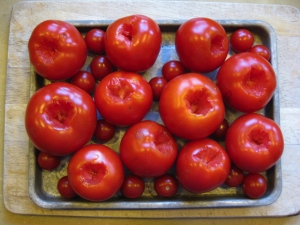The canned tomatoes I usually use for soups and sauces come from California – not an ideal product for an aspiring localvore. I have always considered home-grown tomatoes too precious to use in anything cooked, and prefer to eat them raw. But this week I had a pantry shelf covered with red tomatoes picked before a frost warning, and some were starting to rot. Generally I am not ambitious enough to transform my kitchen into a food-production cannery, or maybe it’s just that the whole process intimidates me. I decided to take the lazy localvore’s way out and try freezing tomatoes whole.
Google proved to be a wealth of information about freezing tomatoes. Most resources recommended blanching them and removing the skins and seeds. That sounded like far too much work. I remembered reading in Mother Earth News that it was possible to freeze whole tomatoes raw, skins and all. I found what I wanted at a website called Tomato Casual. The instructions are brief, because the process is so easy:
Keep in mind that you should always start with firm, ripe, deep red tomatoes and always wash them and cut away the stem scars and any imperfections before beginning.
Freezing tomatoes with skins on:
Simply place the clean, groomed tomatoes on cookie sheets and then in the freezer. When the tomatoes are frozen, transfer them to plastic freezer bags or other freezer-safe containers. When you’re ready to use them, take out as many as you’ll need and simply run them under warm water; the skins should come off easily.
Now this sounded like something I could handle! I decided to freeze the tomatoes on a cookie sheet and transfer them to a ziplock bag when they were frozen, like I do with berries. A whole cookie sheet seemed too heavy and unwieldy, though, so I used a toaster-oven pan.
After a few hours in the freezer, I transferred the tomatoes to a ziplock bag.
Now I have a bag full of what looks like red billiard balls in my freezer! How will they taste? That remains to be seen. They will be mushy, for sure, and only good for soups, sauces, and the like. I will keep you posted!


